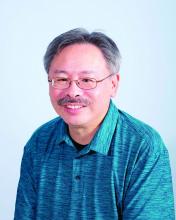User login
Universal masking of health care workers decreases SARS-CoV-2 positivity
Background: Many health care facilities have instituted universal masking policies for health care workers while also systematically testing any symptomatic health care workers. There is a paucity of data examining the effectiveness of universal masking policies in reducing COVID positivity among health care workers.
Study design: Retrospective cohort study.
Setting: A database of 9,850 COVID-tested health care workers in Mass General Brigham health care system from March 1 to April 30, 2020.
Synopsis: The study compared weighted mean changes in daily COVID-positive test rates between the pre-masking and post-masking time frame, allowing for a transition period between the two time frames. During the pre-masking period, the weighted mean increased by 1.16% per day. During the post-masking period, the weighted mean decreased 0.49% per day. The net slope change was 1.65% (95% CI, 1.13%-2.15%; P < .001), indicating universal masking resulted in a statistically significant decrease in the daily positive test rate among health care workers.
This study is limited by the retrospective cohort, nonrandomized design. Potential confounders include other infection-control measures such as limiting elective procedures, social distancing, and increasing masking in the general population. It is also unclear that a symptomatic testing database is generalizable to the asymptomatic spread of SARS-CoV-2 among health care workers.
Bottom line: Universal masking policy for health care workers appears to decrease the COVID-positive test rates among symptomatic health care workers.
Citation: Wang X et al. Association between universal masking in a health care system and SARS-CoV-2 positivity among health care workers. JAMA. 2020;324(7):703-4.
Dr. Ouyang is a hospitalist and chief of the hospitalist section at the Lexington (Ky.) VA Health Care System.
Background: Many health care facilities have instituted universal masking policies for health care workers while also systematically testing any symptomatic health care workers. There is a paucity of data examining the effectiveness of universal masking policies in reducing COVID positivity among health care workers.
Study design: Retrospective cohort study.
Setting: A database of 9,850 COVID-tested health care workers in Mass General Brigham health care system from March 1 to April 30, 2020.
Synopsis: The study compared weighted mean changes in daily COVID-positive test rates between the pre-masking and post-masking time frame, allowing for a transition period between the two time frames. During the pre-masking period, the weighted mean increased by 1.16% per day. During the post-masking period, the weighted mean decreased 0.49% per day. The net slope change was 1.65% (95% CI, 1.13%-2.15%; P < .001), indicating universal masking resulted in a statistically significant decrease in the daily positive test rate among health care workers.
This study is limited by the retrospective cohort, nonrandomized design. Potential confounders include other infection-control measures such as limiting elective procedures, social distancing, and increasing masking in the general population. It is also unclear that a symptomatic testing database is generalizable to the asymptomatic spread of SARS-CoV-2 among health care workers.
Bottom line: Universal masking policy for health care workers appears to decrease the COVID-positive test rates among symptomatic health care workers.
Citation: Wang X et al. Association between universal masking in a health care system and SARS-CoV-2 positivity among health care workers. JAMA. 2020;324(7):703-4.
Dr. Ouyang is a hospitalist and chief of the hospitalist section at the Lexington (Ky.) VA Health Care System.
Background: Many health care facilities have instituted universal masking policies for health care workers while also systematically testing any symptomatic health care workers. There is a paucity of data examining the effectiveness of universal masking policies in reducing COVID positivity among health care workers.
Study design: Retrospective cohort study.
Setting: A database of 9,850 COVID-tested health care workers in Mass General Brigham health care system from March 1 to April 30, 2020.
Synopsis: The study compared weighted mean changes in daily COVID-positive test rates between the pre-masking and post-masking time frame, allowing for a transition period between the two time frames. During the pre-masking period, the weighted mean increased by 1.16% per day. During the post-masking period, the weighted mean decreased 0.49% per day. The net slope change was 1.65% (95% CI, 1.13%-2.15%; P < .001), indicating universal masking resulted in a statistically significant decrease in the daily positive test rate among health care workers.
This study is limited by the retrospective cohort, nonrandomized design. Potential confounders include other infection-control measures such as limiting elective procedures, social distancing, and increasing masking in the general population. It is also unclear that a symptomatic testing database is generalizable to the asymptomatic spread of SARS-CoV-2 among health care workers.
Bottom line: Universal masking policy for health care workers appears to decrease the COVID-positive test rates among symptomatic health care workers.
Citation: Wang X et al. Association between universal masking in a health care system and SARS-CoV-2 positivity among health care workers. JAMA. 2020;324(7):703-4.
Dr. Ouyang is a hospitalist and chief of the hospitalist section at the Lexington (Ky.) VA Health Care System.

